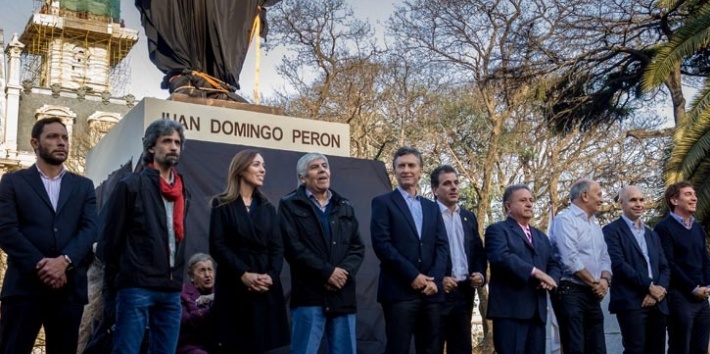During the campaign, President-elect Mauricio Macri winked an eye to Peronists when he unveiled a statue honoring Argentina’s most iconic populist. (Perfil)
EspañolSome 51.4 percent of Argentineans — myself included — recently elected Mauricio Macri, Buenos Aires mayor and former businessman, as president. To be honest, however, we didn’t know what we were choosing. We even voted for him without being convinced that he was a good choice. He was just the only alternative to put an end to the Kirchners’ tyranny.
During the campaign, he distinguished himself from Daniel Scioli, the ruling party’s candidate, in form more than in substance. Unlike his opponent, Macri chose a peaceful, conciliatory, optimistic message.
The substance of Macri’s speeches, however, was not too dissimilar to that of the Kirchnerists. He vowed to keep in place welfare programs, government-owned companies, such as Aerolíneas Argentinas or oil concern YPF, and Tecnópolis, a permanent, government-run mega exhibition.
In short, Macri promised to maintain an interventionist state. In the middle of the campaign, he unveiled a monument honoring Argentina’s former President Juan Domingo Perón, a populist who became a national icon. He also bragged about not sacking a single government worker during his tenure as Buenos Aires mayor.
On the other hand, he might have realized for an instant that his big-government stance was scaring away his liberal voters. In a television interview, Macri said his supporters had no need to worry, since he planned to “remain loyal to the principles” he had always held.
But what principles was he referring to?
The answer is not clear, because Macri managed to become a mystery. Many of us wondered whether he embraced a populist discourse because he actually believed it, or if it was just a strategy to attract votes? After all, the great majority of Argentineans still adhere to ideals of a socialist tendency. Whether they do so consciously or unconsciously is another matter.
As for Macri, he now faces his moment of truth.
Two Roads, One Challenge
Robert Frost, the American poet, famously wrote:
Two roads diverged in a wood, and I—
I took the one less traveled by,
And that has made all the difference.
For Macri, the choice is between the easy road and the arduous path, which also happens to be the right one.
The easy path for Macri is not to go against the grain and please the majority which, in one way or another, supports the Kirchners’ collectivism.
The right path is obviously more difficult to climb, since it implies taking a politically incorrect position. It requires adjusting the role of the government, firing people from their cozy sinecures, privatizing deficit-producing, government-owned companies, freeing the market, removing capital controls, and ending privileges for powerful interest groups.
In other words, the difficult path involves admitting openly that a country can’t grow if its policies are based on looting some people in order to give their money away to others.
If Macri takes on this challenge, he will have to say and do what many don’t want to hear, or don’t want to see done.
Progressives will whine but, in the end, only liberalization can heal the country economically and psychologically. Each individual would be able to stand on his own feet, instead of becoming a burden for others. Argentina could become a country where each of us can get ahead thanks to our own sweat. We will be able to leave behind the role of impotent victims, always dependent on government handouts.
It’s up to Macri to choose how he will be remembered, both as a person and as a politician. Will he add his name to the list of leaders that kept Argentina in an inglorious anonymity? Or will he go down in history as a new “founding father,” following the footsteps of Juan Bautista Alberdi?
Will he succeed in making Argentina one of the world’s most admirable countries? Or will he fail to stop Argentina’s descent into decadence?
We will soon find it out.
Changing the Culture Is Our Task
The task of changing the country, however, does not fall only upon Macri and his Let’s Change coalition. Politicians can do little if the prevailing culture limits their scope of action.
As Canadian-American philosopher Stephen Hicks said, adapting a quote from Stephen Drucker: “culture eats strategy for breakfast.”
Those of us who understand that the zeitgeist determines politics also have a duty to fulfill. We must strengthen the cultural change that began in Argentina on election day. If it doesn’t takes root, it will be a sudden and ephemeral change of direction that won’t affect the country’s future.
Our destiny is uncertain. We have to spread our ideas, fight in the cultural struggle, and influence public opinion in order to bring about real and necessary changes in the future. Last but not least, we have to keep an eye on our rulers, define their boundaries, and point out their mistakes. We have to demand accountability and speak out when they overstep the limits of their power.
We can make a fresh start. We can change. But we can’t afford any distractions. As Thomas Jefferson said: “Eternal vigilance is the price of liberty.”
Open all references in tabs: [1 - 8]


